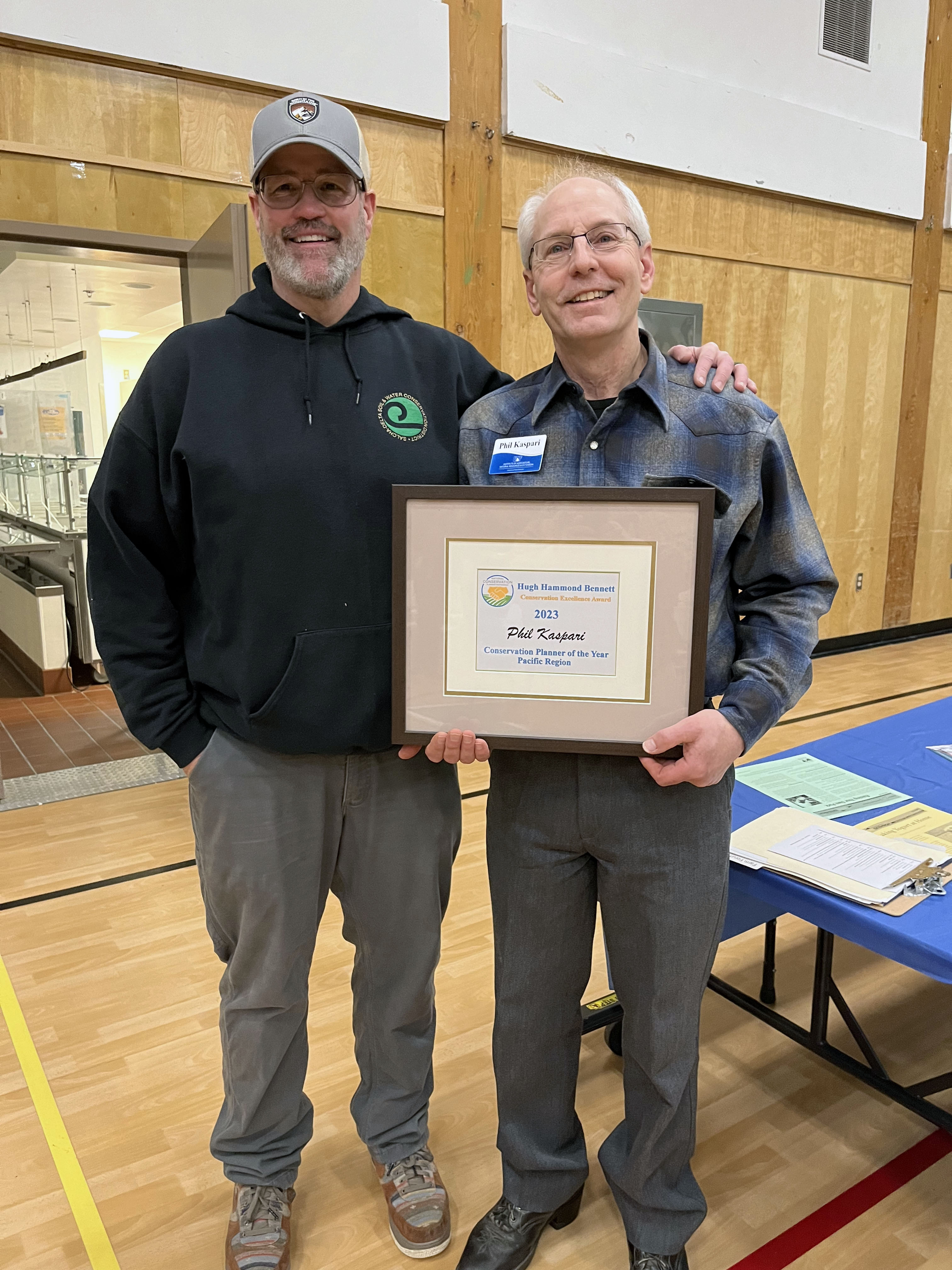By Julie Stricker, UAF Cooperative Extension Service
Phil Kaspari has been an integral part of the Delta Junction agricultural community for more than 30 years, both as a board member of the Salcha-Delta Soil and Water Conservation District (SDSWCD) and as a UAF Cooperative Extension Service agent.
During the 2024 Farm Forum in Delta Junction in March, Kaspari was honored for his service with the Hugh Hammond Bennett Conservation Award, which named Kaspari as the 2023 Conservation Planner of the Year for the Pacific Region. The award recognizes conservation planners within the National Conservation Planning Partnership (NCPP) who have exemplified outstanding service through the development and implementation of sound conservation planning.
In their nomination letter, members of the SDSWCD noted Kaspari’s accomplishments in the region and statewide.
“You can’t go a day in our agricultural community without Phil’s name coming up or Phil making a presence himself. He’s an experienced farmer, a professional agronomist, a respected Extension agent, a devoted SWCD board member, a community collaborator, and a guaranteed helping hand. His professionalism and generosity stretch beyond Delta Junction into the far reaches of Alaska. He is called upon by many because he is the best.”
Over the decades, Kaspari has been involved in a number of programs with a land conservation/stewardship role, both regional and statewide, such as noxious and invasive weed management, and certified weed-free forage and gravel. He is also involved with the wild oats management program, which includes sophisticated seed-cleaning equipment at the Alaska Farmers Co-Op.
In response to the problem of bison encroaching on agricultural fields, Kaspari helped initiate a fencing cost-share program. No-till farming, as a way to prevent erosion, is now common in the region and local farmers can rent a weed sprayer and a no-till drill through another program.
SDSWCD employee Meghan Lene said Kaspari works one-on-one with farmers in his role as a Cooperative Extension Service agriculture agent.
“He ensures that a newcomer to the community knows which crops are marketable and educates them on sustainable and profitable practices.”
One of Kaspari’s biggest impacts on the agriculture community is noxious weed management, Lene said.
“He’s got great knowledge and skill as an Extension agent because he is a professional agronomist, and he’s also the pesticide safety educator and an instructor,” Lene said. “He’s especially knowledgeable in noxious and invasive weed management. He works closely with farmers as well as local and state agencies providing control recommendations, and educates farmers and applicators on safe and effective product use.”
Lene said Kaspari was one of the first people in the state to get producers to participate in the Certified Weed-Free Forage and Straw Products Program led by the North American Invasive Species Management Association. Much of the certified weed-free straw produced in Delta is used in the Iditarod Trail Sled Dog Race, she said.
“The straw that the mushers are using to bed down their dogs has been certified on Delta barley farms and it must be free of the prohibited noxious weed contaminants,” she said. “The Iditarod racing community and organizing agencies have been grateful for these products because of the standard that must be met to reduce the spread or introduction of unwanted and undesirable plants. And Phil has been a big part of that.”
Kaspari’s impact goes well beyond his professional connections, she said.
“I know he spends a tremendous amount of his free time just connecting with the local farming community and understanding their needs,” Lene said. “ He has always been kind of this mover and shaker. The one who always has an ear open but has the professional connections, you know, to really make a strong, positive impact on our community.”
“And he’s just a great listener.”
Kaspari, in his typical soft-spoken, understated manner, credits the people he works with for much of his success.
“What I am probably most thankful for is the highly skilled staff that our SWCD has been able to hire and retain, some of whom I was directly involved with hiring,” Kaspari said. “It is rewarding to witness (and sometimes play a part in) all the worthwhile projects they accomplish.”
